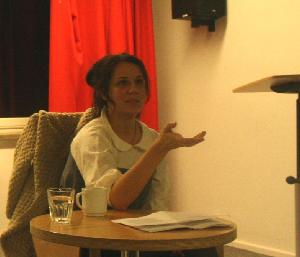How can science relate to literature? Is a novel with a scientific backbone necessarily concerned with problems of objectivity? Can science be emotional in any sense?
It was both exciting and daring to mingle these questions and many more in the presence of Rivka Galchen, the last guest lecturer for the Autumn term at ECLA. She is the author of freshly-published novel Atmospheric Disturbances, which was included in the Project Year Core Course on ‘Objectivity’ by ECLA professors Catherine Toal and Bruno Macaes. Only ten students (PY) had the chance to experience Rivka’s writing, but having an open lecture offered the entire student body a glimpse into her understanding of authorship. Attracted to oppositions and paradoxes, though refraining from qualifying them as such, the young author declared that she was flattered by critical reviews of her style as ‘masculine’. From her perspective, authorship presupposes a form of detaching from the real self and submitting to ‘another’ who takes charge of putting fiction on paper. The process materialized successfully in her first novel, Atmospheric Disturbances, which is narrated by the character Leo, a middle-aged psychiatrist engaged in constant analysis of himself and his surroundings.
Rivka Galchen shared with us insights about the project of the book. Her purpose was to take ordinary pain and make it into a case of hysteria. Leo is haunted by the imaginary disappearance and replacement of his beloved wife, but while trying to retrieve her, he wanders further into uncertainty and loses himself. The novel incorporates a few auto-biographical elements, like pictures of the author’s family, excerpts from her father’s meteorological research, and even his name. These details reveal how much of reality Rivka’s authorial ‘other’ is allowed to present.
Coyly she confessed to the students: “If I felt like I had very much to say to people, I would not be a writer.” In spite of her professed timidity, she does have much to say and to write to people, being primarily drawn into literature by the sensations it produces, and by the manner in which general truths can be recalled and modified in fiction, as through a grinding machine. When white noise stands out from the rest, for a few instants, and rubs against one’s eardrums, realism enters one’s life, and also one’s writing, she explains.
As for the relation of science to literature, it is enough to mention that our guest is a physician, a writer, and a professor. And science in the novel is exemplified by psychoanalysis and meteorology! The ambivalence between reverence for and revolt against the authority of science is what enticed Rivka into creating a character who takes up “the rhythm, the cadence, the vocabulary of science, even as he so obviously misappropriates them to whatever purpose suits his emotional needs. He convinces himself that he’s turning to science for authority, when really he’s cloaking himself in its mystery.” In writing, she aims at being “rigorously playful” which one can sense in the construction of Leo. She advised that by letting the process of writing influence you back, as much as you control it as an author, you can create more than you already possess.
Esteemed literary critic James Wood (whose latest book, How Fiction Works, is also a part of the PY core course) describes her novel as “original and sometimes affecting, one that knows how to move from the comic to the painful.” In a “consensus view of reality” (a gripping recurring phrase in the novel) one cannot but agree with him, and be seduced by emotions laid out with their opposites, in puzzling, but aesthetically pleasing ambivalences.
Rivka Galchen is currently teaching creative writing at Columbia University. She received her M.D. in psychiatry from Mount Sinai School of Medicine, and completed a Master of Fine Arts at Columbia.
By Brindusa Birhala ('09, Romania)

